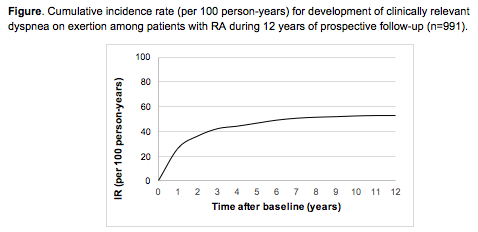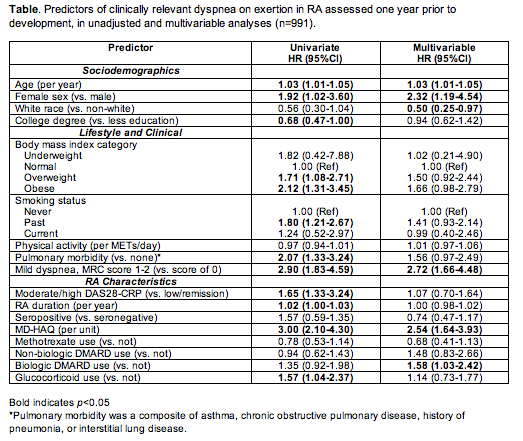Session Information
Date: Tuesday, November 7, 2017
Title: Rheumatoid Arthritis – Clinical Aspects Poster III: Comorbidities
Session Type: ACR Poster Session C
Session Time: 9:00AM-11:00AM
Background/Purpose : Dyspnea on exertion symptoms often prompt clinical evaluation related to respiratory, cardiovascular, and functional status. However, the incidence and predictors of clinically significant dyspnea among patients with rheumatoid arthritis (RA) has not been previously investigated.
Methods : We investigated dyspnea among RA patients using a single-center cohort of patients with RA and up to 12 years of prospective follow-up. We defined signidicant dyspnea on exertion using the Medical Research Council Dyspnea measure (³3 on 0-5 scale; unable to ambulate without breathlessness or worse, as previously validated), assessed at baseline and annually. We analyzed subjects with complete covariate data and no significant dyspnea at baseline and at least one year of follow-up. We determined the incidence rate (IR) of dyspnea during follow-up. Sociodemographics, lifestyles, clinical factors, and RA characteristics were considered as time-varying predictors assessed prior to the outcome. We used Cox regression to estimate the hazard ratios (HR) for dyspnea occurring one year after predictors were assessed throughout follow-up.
Results : We analyzed 991 patients with RA and no significant dyspnea at baseline during mean 5.1 (SD 3.8) years of follow-up. At baseline, mean age was 55.5 (SD 13.6) years and 66.0% were seropositive. During 5,041 person-years of follow-up, 142 (14.3%) subjects developed incident dyspnea (IR 52.5 per 100 person-years). The dyspnea IR was highest in the first year after baseline (IR 26.3 per 100 person-years, Figure). Independent predictors of clinically significant dyspnea were: older age (HR 1.03, 95%CI 1.01-1.05 per year, Table), female sex (HR 2.32, 95%CI 1.19-4.54), white race (HR 0.50, 95%CI 0.25-0.97 vs. non-white), obesity (HR 1.66, 95%CI 0.98-2.79 vs. normal), worsened functional status by MD-HAQ (HR 2.54, 95%CI 1.64-3.93 per unit), and mild dyspnea (HR 2.72, 95%CI 1.66-4.48 vs. no dyspnea). Biologic use was associated with dyspnea (HR 1.58, 95%CI 1.03-2.42 vs. non-use), but other RA characteristics including DAS28-CRP, seropositivity, duration, methotrexate use, and glucocorticoids were not associated with incident dyspnea.
Conclusion : In this long-term prospective study, the development of clinically significant dyspnea on exertion occurred in 14% of patients with RA. We identified sociodemographics (older age, white race, female sex), clinical factors (obesity, mild baseline dyspnea), and RA characteristics (MD-HAQ, biologic use) assessed prior to dyspnea development that inform intervention studies related to decreasing the respiratory and cardiovascular burden of RA.
To cite this abstract in AMA style:
Sparks JA, Doyle T, Pan B, Iannaccone C, Frits M, Dellaripa P, Rosas I, Lu B, Weinblatt M, Shadick NA, Karlson E. Incidence and Predictors of Dyspnea on Exertion in a Prospective Cohort of Patients with Rheumatoid Arthritis [abstract]. Arthritis Rheumatol. 2017; 69 (suppl 10). https://acrabstracts.org/abstract/incidence-and-predictors-of-dyspnea-on-exertion-in-a-prospective-cohort-of-patients-with-rheumatoid-arthritis/. Accessed .« Back to 2017 ACR/ARHP Annual Meeting
ACR Meeting Abstracts - https://acrabstracts.org/abstract/incidence-and-predictors-of-dyspnea-on-exertion-in-a-prospective-cohort-of-patients-with-rheumatoid-arthritis/


